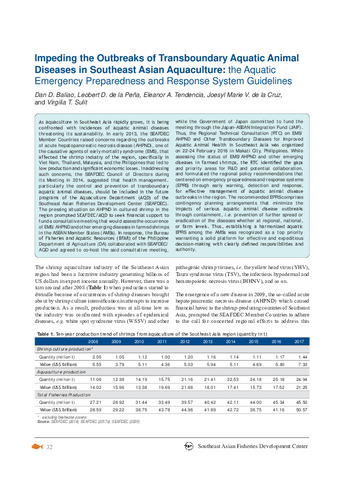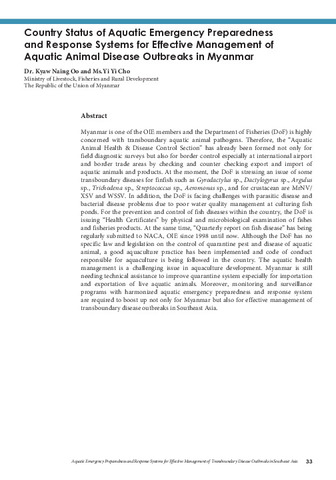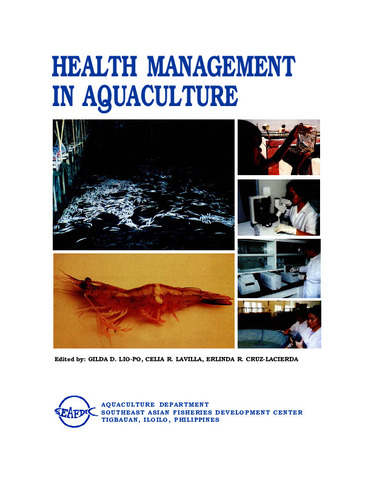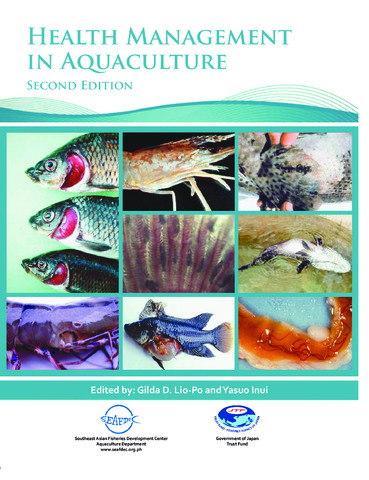Impeding the Outbreaks of Transboundary Aquatic Animal Diseases in Southeast Asian Aquaculture: the Aquatic Emergency Preparedness and Response System Guidelines
Share
Abstract
As aquaculture in Southeast Asia rapidly grows, it is being confronted with incidences of aquatic animal diseases threatening its sustainability. In early 2013, the SEAFDEC Member Countries raised concerns regarding the outbreaks of acute hepatopancreatic necrosis disease (AHPND), one of the causative agents of early mortality syndrome (EMS), that affected the shrimp industry of the region, specifically in Viet Nam, Thailand, Malaysia, and the Philippines that led to low production and significant economic losses. In addressing such concerns, the SEAFDEC Council of Directors during its Meeting in 2014, suggested that health management, particularly the control and prevention of transboundary aquatic animal diseases, should be included in the future programs of the Aquaculture Department (AQD) of the Southeast Asian Fisheries Development Center (SEAFDEC). The pressing situation on AHPND in cultured shrimp in the region prompted SEAFDEC/AQD to seek financial support to fund a consultative meeting that would assess the occurrence of EMS/AHPND and other emerging diseases in farmed shrimps in the ASEAN Member States (AMSs). In response, the Bureau of Fisheries and Aquatic Resources (BFAR) of the Philippine Department of Agriculture (DA) collaborated with SEAFDEC/AQD and agreed to co-host the said consultative meeting, while the Government of Japan committed to fund the meeting through the Japan-ASEAN Integration Fund (JAIF). Thus, the Regional Technical Consultation (RTC) on EMS/AHPND and Other Transboundary Diseases for Improved Aquatic Animal Health in Southeast Asia was organized on 22-24 February 2016 in Makati City, Philippines. While assessing the status of EMS/AHPND and other emerging diseases in farmed shrimps, the RTC identified the gaps and priority areas for R&D and potential collaboration, and formulated the regional policy recommendations that centered on emergency preparedness and response systems (EPRS) through early warning, detection and response, for effective management of aquatic animal disease outbreaks in the region. The recommended EPRS comprises contingency planning arrangements that minimize the impacts of serious aquatic animal disease outbreaks through containment, i.e. prevention of further spread or eradication of the diseases whether at regional, national, or farm levels. Thus, establishing a harmonized aquatic EPRS among the AMSs was recognized as a top priority warranting a solid platform for effective and expeditious decision-making with clearly defined responsibilities and authority.
Suggested Citation
Baliao, D. D., de la Peña, L. D., Tendencia, E. A., de la Cruz, J. M. V., & Sulit, V. T. (2020). Impeding the Outbreaks of Transboundary Aquatic Animal Diseases in Southeast Asian Aquaculture: the Aquatic Emergency Preparedness and Response System Guidelines. Fish for the People , 18(2), 32-36. http://hdl.handle.net/20.500.12066/6561
Subject
Collections
Related items
Showing items related by title, author, creator and subject.
-
Country status of aquatic emergency preparedness and response systems for effective management of aquatic animal disease outbreaks in Myanmar
Oo, Kyaw Naing; Cho, Yi Yi (Aquaculture Department, Southeast Asian Fisheries Development Center, 2019)Myanmar is one of the OIE members and the Department of Fisheries (DoF) is highly concerned with transboundary aquatic animal pathogens. Therefore, the Aquatic Animal Health & Disease Control Section has already been ... -
Health management in aquaculture
Lio-Po, Gilda D.; Lavilla, Celia R.; Cruz-Lacierda, Erlinda R. (Aquaculture Department, Southeast Asian Fisheries Development Center, 2001)A textbook on diseases of cultured warmwater fish and shrimps in the Philippines. Eleven chapters cover essential information on the basic principles of disease causation, major diseases of cultured fish and crustaceans, ... -
Health management in aquaculture
Lio-Po, Gilda D.; Inui, Yasuo (Aquaculture Department, Southeast Asian Fisheries Development Center, 2010-07)A textbook on diseases of cultured warmwater fish and shrimps in the Philippines. Eleven chapters cover essential information on the basic principles of disease causation, major diseases of cultured fish and crustaceans, ...





